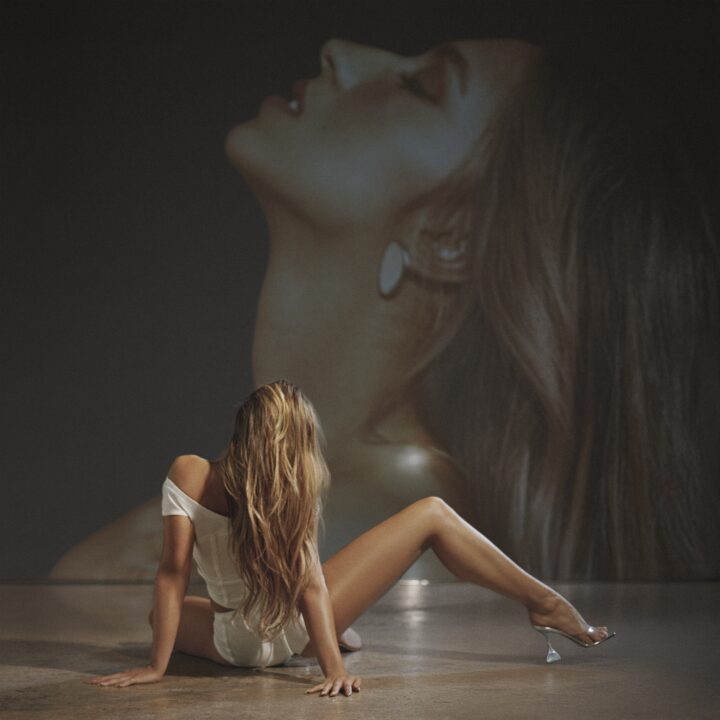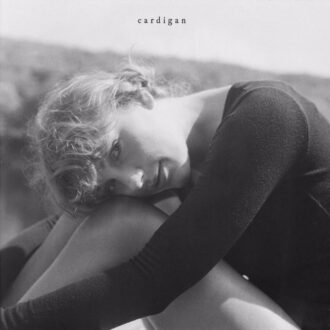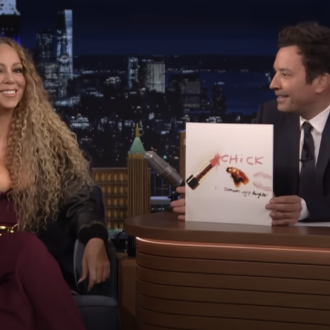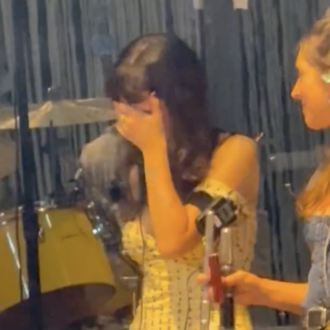Tate McRae’s Sisyphean Climb To Superstardom
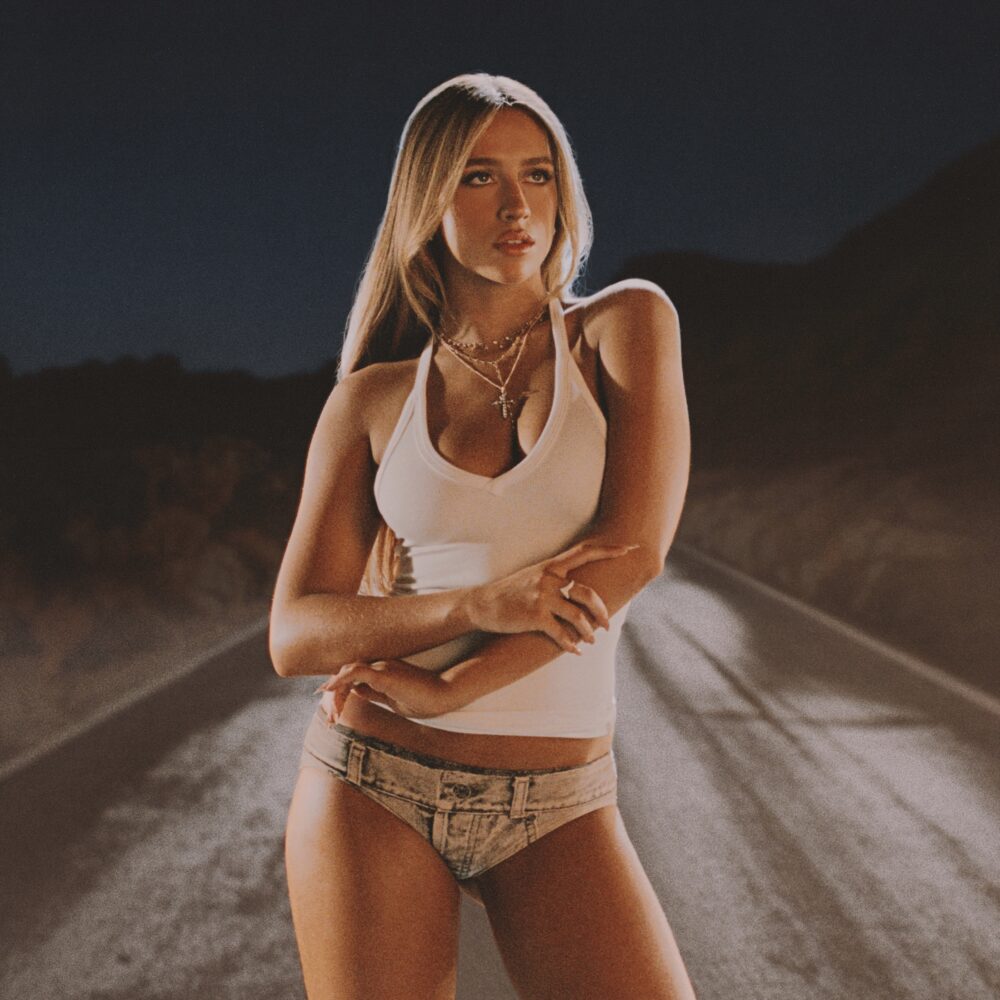
Charlie Denis
The summer/fall 2025 issue of Gen V, an offshoot of high-fashion V Magazine, commissioned a glossy, splashy, Nicola Formichetti-styled cover story celebrating the “inauguration into pop royalty” of Canadian artist Tate McRae. Here is the lead of that story: “In the beginning, God created heaven, earth, and Britney Spears.”
This makes more sense in context. The profile was a celebrity interview with McRae, conducted by Spears herself. McRae has been open about coveting the singer’s early career, patterning her sound, image, and choreography after her 2000s hits. She’s even recreated one of Spears’ old red-carpet looks almost exactly. For McRae, the V Magazine profile must have been huge: a surreal, life-defining, is this really happening? acknowledgement by her idol. (Insert grumble about how back in my day, pop icons acknowledged their protegees with iconic awards-show moments, not interviews done via email and/or publicist.) But it still meant that Tate McRae’s big media debut began by extolling the elemental power of somebody else.
For all of you who like dichotomies, there are two types of rising pop star. Some artists seem to explode into public awareness immediately, whether via a huge hit or a viral moment; after this, they’re automatically accepted as the new main pop girl, credentials proven and dues paid. Chappell Roan falls into this category; so does Olivia Rodrigo. Others grind it out for years, incrementally stacking up Spotify playlist spot after terrestrial-radio add after TikTok short, until people grudgingly accept that they’re not just faceless makers of, as The New York Times put it, “hits without stars.” Addison Rae is here as of “Diet Pepsi”; Dua Lipa was here until Future Nostalgia.
These categories are arbitrary. Pretty much every “instant success” had her own period of grinding it out – for Roan, an ill-fated Atlantic Records deal dating back to 2015, and for Rodrigo, Disney Channel juvenilia. The categories don’t correlate neatly to talent, confidence, personality, musical style, industry connections, or prior fame. (They do correlate to media coverage, but there’s a chicken-and-egg quality to that; publications don’t write about people they don’t think audiences care about.) But they’re real in that people tend to be absolutely convinced that an artist must belong to the category they do, because of some intrinsic quality they have. And despite Tate McRae having now released three albums, she still seems perpetually stuck in category 2.
Things weren’t always that way. A childhood dance prodigy, McRae studied with the Alberta Ballet Company’s training program, did several Maddie Ziegler-esque cameos in pop music videos, became a spokesperson for dancewear juggernaut Capezio, and – most visibly to the general public – was on season 13 of So You Think You Can Dance, placing third. By age 11, McRae was already known, according to a profile in industry publication Dance Informa, as “a versatile, game-for-anything, unstoppable dancer” – more unqualified praise than most of what she’s received since.
McRae had also been developing a serviceable singing voice that she turned into a serviceable musical career, usually defined in terms of others. Her first biggish single, “You Broke Me First,” was a mopey ballad with a darkish, lightly dramatic synthy arrangement that got her tagged as a Canadian Billie Eilish. (In that Gen V interview, Britney says it’s one of her favorite songs, which is… actually really believable.) By 2022’s “She’s All I Wanna Be,” McRae had decided that those old ballads would be better with some “upbeat punk energy” – i.e., if they sounded more like the Olivia Rodrigo album that had just popped off. “Greedy” introduced Max Martin-ish synth stabs and TRL-adjacent choreography, and the recent “It’s OK I’m OK” and “Sports Car” doubled down on that 2000s sound.
Several of these songs became hits, even big hits – “Greedy” peaked at #3 on the Hot 100 – but none of them definitively answered the question, as Pitchfork put it: “Is she a main pop girl yet?” Amusingly, some of the harshest stuff is coming out of Canada. Drake name-dropped McRae on his new album as the embodiment of “small-town fame” – and because it’s Drake talking about a woman, the line inevitably came off as a neg. Meanwhile, the CBC brought in an American critic to just absolutely annihilate her with faint praise: “She embodies two separate characteristics… one of them is that she is Canadian, and then the other is that she is a dancer.”
So Close To What, released last Friday, probably won’t change that perception. Though the album is projected to debut at #1 with more than 150,000 in first-week sales, it’s another work of musical malleability. Most of it was cowritten with Amy Allen and Julia Michaels and produced by Ryan Tedder of OneRepublic – industry veterans who are so prolific and chameleonic that the only conclusion you can draw from the artists they’ve worked with in the past is that there are a lot of them. You can hear vague hints of some of those artists across the tracklist: “Revolving Door” applies Michaels’ nervous energy to the tormented R&B of Usher’s generational “Climax,” and the pillowy, Emile Haynie-produced “Purple Lace Bra” is McRae’s version of “Diet Pepsi.” Increasingly buzzy (and increasingly poppy) rapper Flo Milli has a sassy but unobtrusive verse on the skittering, lightly introspective post-Pantheress cut “Bloodonmyhands.” Rapper the Kid LAROI (also McRae’s boyfriend) clocks in for a verse and some harmonies on the genial “I Know Love.”
The Britney affectations are the most obvious, and McRae’s team makes sure you don’t miss them – it’s not a coincidence that the two most Britney-ish tracks, “It’s OK I’m OK” and “Sports Car,” were also two of the singles, and that the third — “Miss Possessive,” with its pinched, rhythmic prechorus — is the album’s first track. But they’re still just affectations; if someone wasn’t familiar with McRae before this album, they might just as easily think So Close To What sounds like Ariana Grande, or like fellow dancer-turned-singer Ciara. Most of these songs blur into one another, though, having the same midtempo trap beat and the same melody-forward construction. The album isn’t especially long – only a few tracks pass the 3-minute mark – but it feels it; the experience is like listening to one of those megamix CDs made for dance troupes, start to finish on its own. That’s new for McRae; she told Rolling Stone recently that doing choreo-forward tours changed her relationship to songwriting. “I never would start a session thinking about a beat or how it makes me feel as a dancer. I’d always think about it as writing a diary entry.”
The marketing does make sense, though. McRae’s one of the few people in her pop cohort who can match Spears purely as a dancer, and there’s a huge untapped audience of people who watched Framing Britney Spears and sympathize with the former star but also have unshakeable nostalgia for the career that destroyed her life. The public just really wants an ethical Britney – if such a thing is even possible.
Tellingly, the version of Spears that Tate McRae has emulated is the one who’d started to follow musical trends rather than set them – and the one who hadn’t yet had a traumatic breakdown. The Britney album So Close To What sounds most like is In The Zone – which, although it’s hard to recall now, was Spears’ response to several successive setbacks. After the (relative) commercial underperformance of Britney, the public humiliation of Justin Timberlake’s “Cry Me A River” video accusing her of cheating, the dalliances with folks like Fred Durst, and the tabloids growing increasingly vicious, she retreated and regrouped. She dropped Max Martin, the producer she put on the map and vice versa, and recorded tracks with guest artists for the first time in her career. And she lowered her expectations, actually telling the press, “I’m not doing ‘…Baby One More Time’ and those big, massive hits anymore.” (Yes, In The Zone was the album with “Toxic.”)
Unlike Spears, though, McRae is making music during a time that at least claims to allow artists a healthier relationship to fame and sexuality, and this is where her old diarist writing shines. When McRae sings about situationships, she sounds less like a supernova sex symbol than an ordinary girl; she sounds like she’ll basically, as her single put it, be OK. And when she sings about her career, she sounds like she has at least some agency over it. Spears’ label Jive, according to producers Bloodshy & Avant, had an “unwritten rule” not to let her release songs that addressed her reputation, a rule that was skirted around with the heavily allegorical “Lucky” and only finally broken with “Piece Of Me.” Nowadays, the music industry doesn’t just allow artists to talk about their reputation, it practically expects them to. “Like I Do” is ostensibly a “Girl, so confusing” track about a frenemy, but it could just as easily apply to parasocial fans or to haters in the press: “You think about me 10 times more than even your own life… know you’re prayin’ on my downfall.”
And while McRae’s received dim versions of the criticism Spears got over her music being overly sexualized or frivolous, the stakes aren’t so career-threatening. After a year where Billie Eilish bragged about eating girls out, Sabrina Carpenter invited a dude to knock her up and turned the word “camaraderie” into a filthy pun, and even Taylor Swift confessed her tortured sexual fantasies, stuff like “you look good on top of me” and a prayer to “take ‘amazing’ out of our sex” (a Julia Michaels idiosyncrasy) just does not register as scandalous. The most explicit line – “Giving you head’s the only time you think I’ve got depth” – isn’t a come-on but a complaint. This is from “Purple Lace Bra,” based on one of McRae’s actual diary entries, and it grapples with her new image directly: “Did my purple lace bra catch your attention? Did my dance on your lap pique your interest?”
These questions, unfortunately, do answer themselves. It’s not a coincidence that the first words you hear on So Close To What, before McRae comes in, are from a voice memo by Sydney Sweeney – the actress who starred on the hit series Euphoria but who’s now arguably better known for a series of very stupid but very public controversies about how her fame proves that, as The Spectator put it, “Boobs are back!” Some things haven’t changed that much since 2001. “Would you hear me more if I whispered in your ear? Made all my inner thoughts sound like, ‘ah, ah’,” McRae sings, knowing that the answer to that question is “yes.”
POP TEN
Benson Boone - "Sorry I'm Here For Someone Else"
That “two categories of pop star” thing doesn’t just apply to women. Benson Boone was an exemplar of category 2, hardworking and ignored – right up until the Grammys, which singlehandedly changed his existence in a lot of people’s minds: from the guy they heard on TikTok for 15 seconds at a time but couldn’t put a face to, to the guy doing backflips and grabbing his crotch in a low-cut aqua jumpsuit.
Boone is very much aware of his new image, which is probably why his latest single isn’t another earnest folk-rock song but a synthy Brandon Flowers homage with a thirst-trap video. (People are also saying Freddie Mercury; I assume that’s just the mustache.) This is the best outcome for everyone involved – except, I guess, his date after the lyrics’ surprise ending.
JENNIE - "ExtraL" (Feat. Doechii)
All four members of Blackpink have now launched solo careers. Jennie, who was one of the first, feels confident enough to boast that “you sit too far down on ’em charts to even ask me who’s in charge” – the kind of line that probably shouldn’t be fact-checked or cross-referenced against anyone. Nevertheless, “ExtraL” is the best single she’s ever released – largely due to Doechii, whose presence demands that Jennie and the track match her energy.
Halsey - "Safeword"
Wait, where’s the Le Tigre photoshoot?
Selena Gomez, Benny Blanco, & Gracie Abrams - "Call Me When You Break Up"
A sweet, just-light-enough song by Gomez, her fiancé, and confessional songwriter Gracie Abrams about wanting to be there for your soulmate the minute that soulmate becomes single because the two of you were meant for one another. “To get an obvious statement out of the way, this song is actually about a best friend that I have in my life so it’s not about anything that you think it is,” Gomez said of this duet. OK!
Djo - "Delete Ya"
A song like “Delete Ya,” with its reverb-drenched “Every Breath You Take” arrangement, wonky sotto-voce delivery, and generous sprawl is hard to imagine getting onto the radio these days without external factors – like the artist being a former Stranger Things actor coming off a viral hit. A lot of things about “Delete Ya” might be annoying in another context, such as the jaunty chorus vocal or self-consciously meta songwriting like referring to “a lyric that, in context, stings.” (Keery sings it like he’s including the commas.) Yet the single remains charming: Stylishness makes up for a lot.
Babymonster - "Billionaire"
Is Mya’s “Case Of The Ex” having a little bit of a moment? There’s this recent semi-cover by R&B singer Shantel May, and there’s this K-pop song, whose cool restraint and taut staccato rhythm recall that single without even interpolating it. To be clear, I’m all for this (as are others).
FLO - "On & On"
Another solid track by the R&B girl group. What I like about “On & On” is how deceptively relaxed the arrangement sounds, but how FLO nevertheless sound like they’re in complete control, their harmonies optimized down to the second and their poise never slipping. They radiate confidence – and competence too.
Fakemink - "Easter Pink"
A low-budget, low-fucks-given version of BRAT (might just be the British accent), getting close to the least possible effort one can put into this kind of track and still have me love it. I wanted to pass along this YouTube comment, though: “My wife of 43 years passed away back in 1972 and this was by far her favourite song. It still brings me to tears hearing it today. luv u fakemink.”
Rico Nasty - "Teethsucker"
While we’re on the subject of reviving things from the late 2000s, hear me out: Rebirth is coming back. Hear me out!
Debbii Dawson - "You Killed The Music"
Debbii Dawson doesn’t have an especially unusual background: a modeling career, a spot on America’s Got Talent. These alone don’t explain why “You Killed The Music” has become a bit of an Internet curiosity. The song is a crystalline ABBA homage that’s so earnest that it’s surreal – I don’t say this lightly, but the effect is almost Lynchian. Imagine if one of those fake pop songs from movies were actually good.
CLOSING TIME
Why is Yung Miami in the black lodge pic.twitter.com/sy5TviNNfp
— Ash (@Ahsotn) February 13, 2025
